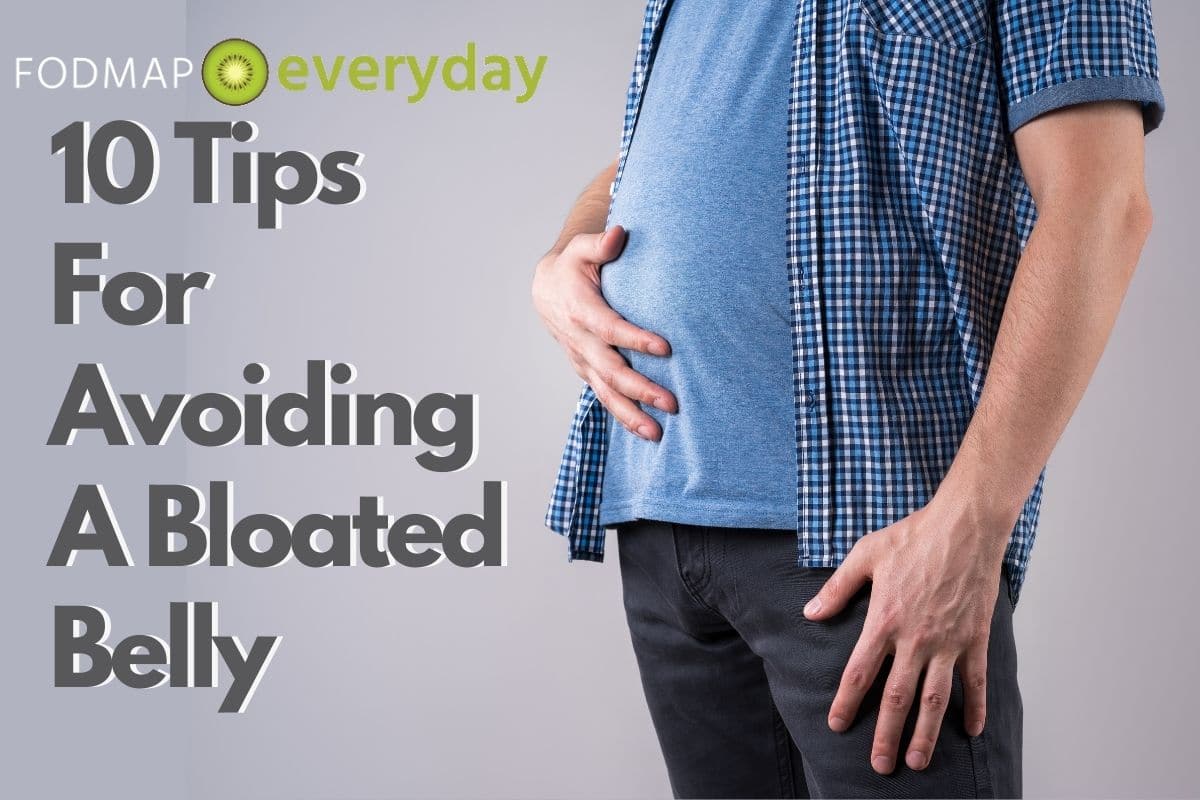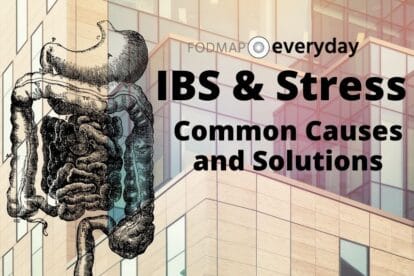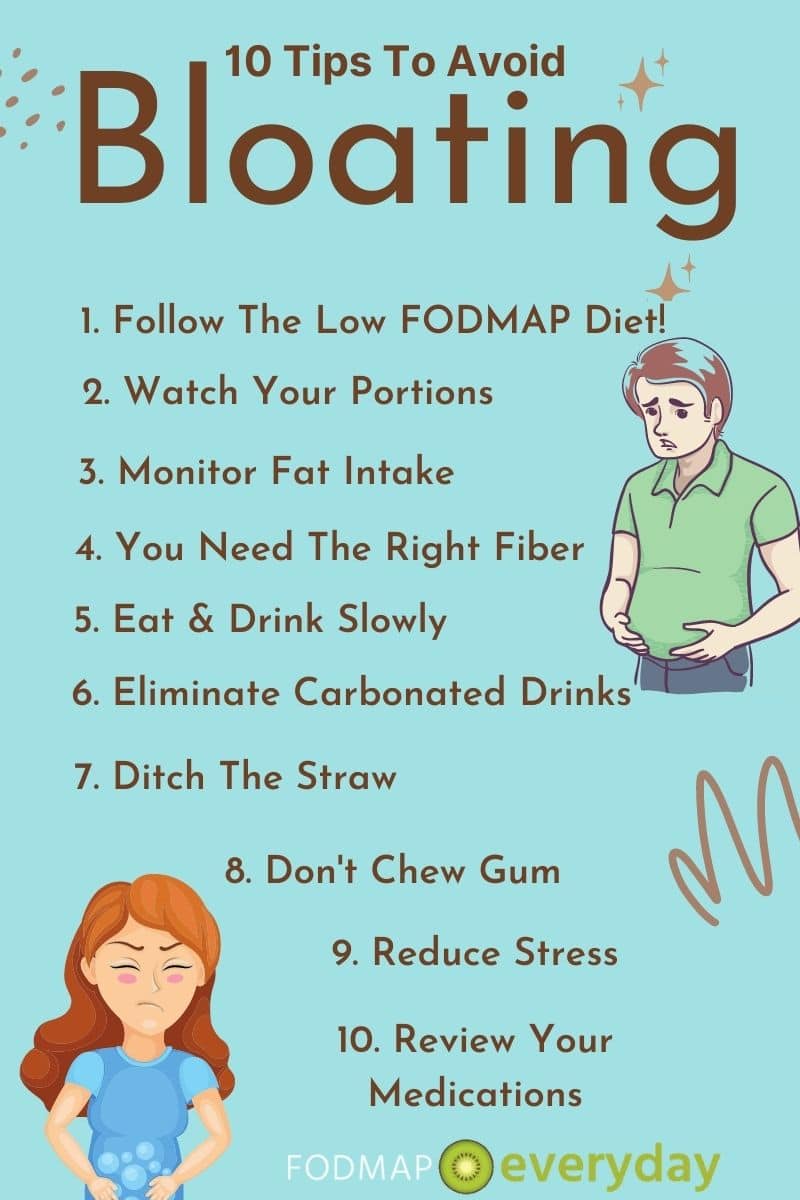How To Avoid or Get Rid Of A Bloated Belly
Those of us with digestive issues talk about bloating – a lot. And the #1 thing everyone wants to know is, how to avoid and get rid of a bloated belly.
We have 10 Tips for you for Avoiding a Bloated Belly. And 5 for Getting Rid of a Bloated Belly in case it’s too late already!
For an in-depth look at what bloating is, is not, and whether there is reason to be concerned, please read our article, What Conventional Wisdom Gets Wrong About Bloating, by Tamara Duker Freuman MS RD CDN. She wrote THE BOOK on bloating, The Bloated Belly Whisperer, and we highly recommend it.
And what if you already have a bloated belly? Scroll to the bottom of this article for our tips on eliminating the bloat!

10 Tips for Avoiding a Bloated Belly
Let’s have a look at ten different ways that gas can enter your digestive system and what to do about it.
1. Follow The Low FODMAP Diet!
You saw that coming, didn’t you? In people not reactive to FODMAPs, FODMAPs are absorbed through the lining of the small intestine with little fanfare. When an individual has difficulty with this, as in those with IBS, excess FODMAPs pass to the large intestine, where the resident bacteria cause them to ferment. The fermentation produces hydrogen or methane, which causes the bloating. The low FODMAP diet, during the Elimination Phase, minimizes the amount of FODMAPs that your gut has to deal with, hence less fermentation and reduced bloating.
To understand the relationship between FODMAPs and IBS this video from Monash University provides a simple explanation.
2. Watch Your Portions
One cannot follow the low FODMAP diet without carefully monitoring portions, and therefore this recommendation is really part of the suggestion above, but deserves its own call-out since it is often misunderstood.
The great majority of foods that have a low FODMAP portion size also have moderate and high FODMAP serving sizes, and this is possibly the number one area where we see people making portion related choices that lead to FODMAP overload. In addition to, but related to, portions, we highly suggest that you educate yourself about FODMAP stacking.
Very often we hear from people who think they need to “detox” in order to get rid of their bloat. They talk about turning to high protein powders, meal replacement beverages and snack bars, looking for a miracle fix. First of all, any product that tells you it is going to help you detox is a gimmick.
That said, there are many low FODMAP products that make portion control easier, such as Monash University certified low FODMAP snack bars. These days it is easier than ever to find the flavor that rings your bells. BelliWelli Fudge Brownie anyone?

Have you tried Belliwelli Low FODMAP Snack Bars yet? Click here for your new favorite grab and go snack!
3. Monitor Fat Intake
Fat can be a gut irritant due to its ability to increase colonic hypersensitivity. All the cells in your body require fat, so you shouldn’t cut it out of your diet completely. You need to eat enough fat to stay healthy and feel well, without triggering your symptoms. It’s a fine line and the tolerable level will be different for each individual.
You have to find out where that line is for you. For instance, a drizzle of olive oil on a small salad might be okay, but perhaps deep-fried chips or French fries will cause bloating and other IBS symptoms. Consuming too little dietary fat can aggravate constipation among other things, so do get as much as possible within your individual limits and find that balance that will keep you bloat-free.
4. You Need The Right Fiber
Fiber is important for everyone’s diet and digestion, but for those with IBS you want to make sure you are getting the right kind of fiber and the right amount. Fiber can be a gut irritant and cause bloating. For a deep-dive, read our article, Fiber and IBS: What You Need To Know, by Monash University trained RD Vanessa Vargas.
You do need fiber for “normal” bowel function. Around one ounce (28 grams) is the recommended daily fiber intake for the general population. As an IBS sufferer, you may need to eat less in order to prevent fiber-induced symptoms, like bloating. And, recommendations will be different, depending on whether you are IBS-D or IBS-C.
The exact amount of fibre you should consume is highly individual, and trial and error is the only way to find out what works for you. It’s a fine balance, but it’s important to experiment in order to get as much fibre into your diet as possible without triggering your bloating.
5. Eat & Drink Slowly
Everyone is busy, busy, busy these days and so food is no longer a moment of quiet pleasure when you sit down and focus on the act of eating. More often than not, it is consumed in a rush while working, driving, applying makeup or getting the kids ready for school. Or perhaps with a group of friends laughing and talking with the focus on anything but eating.
Subsequently air is gulped down with the food through eating too fast, talking while eating, or mindless eating with the mouth open. Make a concerted effort to eat calmly, slowly and as much as possible with a closed mouth.
6. Eliminate Carbonated Drinks
The bubbles in carbonated drinks are gas pockets that get introduced into the intestines when consumed. This can build up and cause bloating. This includes any sort of fizzy drink like soda or sparkling water. None are exempt.
7. Ditch The Straw
Another way to contribute to your bloating while drinking is to drink through a straw. A considerable amount of air is swallowed during this process. Avoid carbonated drinks and straws to eliminate these possible causes of your bloating.
8. Don’t Chew Gum
When you chew gum, you swallow more often and some of what you’re swallowing is air. This air enters your small intestines, placing pressure on the abdomen and surrounding areas. Digestive gases mix with the swallowed air, causing increased pressure. Also, the artificial sweeteners, such as sorbitol, that are found in some gums can give you gas through fermentation.
Chewing gum fools the body into thinking it is about to receive food and so the gut enzymes and acids are activated which can cause an overproduction of stomach acid, and can affect your ability to produce enough digestive secretions when you need them, contributing to your IBS symptoms, including bloating. Avoid chewing gum.
9. Reduce Stress
Stress and anxiety can lead to bloating through hyperventilation because you are taking in more air than you need. But even without hyperventilation, you will possibly breathe faster and shallower, swallowing air in the process, which will cause bloating.
But most importantly, many studies show that stress throws off the balance of the gut microbiome, causing IBS symptoms including bloating. Stress is unavoidable, but when it strikes, take even, rhythmic breaths down into your abdomen as opposed to your chest to convince the body that the stress doesn’t exist.
This simple exercise alone can interrupt the messages of stress that travel from your brain to your gut, where they create the chaos of IBS symptoms. Read our article IBS and Stress: Common Causes and Solutions for more info.

Ditch the stress: IBS and Stress: Common Causes and Solutions
10. Review Your Medications
Many medications are life-saving and should never be stopped or even altered without a consultation with your medical doctor, but it’s important to be aware of the side effects of any medicines you are taking because many of them can cause bloating.
This may go unnoticed by someone without IBS, but an IBS sufferer will always be affected negatively by any bloating because of their hypersensitive gut. If possible, avoid any non-essential medicines since many contain high FODMAP ingredients like sorbitol in cough remedies and mannitol in antacids.
We have an article for you on Medications & Supplements that will give you a thorough overview.

Already Bloated? Our Top 5 Tips For Eliminating The Bloat!
What if you are experiencing a bloated belly right now? All of the tips above are great for future planning, but we understand if you want relief quickly.
Here are some tried and true tips that can help. Please note that not every tip works for every person, and also sometimes one of these tips might work at one time, and not another. It is always good to have a few things in your arsenal:
1. Take a Gas Reliever, such as Gas-X. For more information on medications and supplements, please refer to our in-depth article.
2. Twisting and Stretching: The right yoga moves, such as downward dog, child’s pose, cat/cow and pigeon pose can help relieve gas and bloat. You can also try stretching your arms above your head and gently twisting to one side, and then the other.
3. Movement: Moving in general can be very helpful. When bloating is caused by a gas, the pain is caused by the gas being stuck. Movement can help move the gas. Even simply walking can do the trick. Are use your instincts: for some people gentle movement is what is needed, and for others vigorous cardio can really help.
4. Switch It Up: Basically, change whatever you are doing. If you were sitting, stand up, if you have been static in the same position for a while, get moving. If you have been eating, perhaps stop.
5. Try Abdominal Massage. We even have a video for you! Targeted massage can often I help.
For more tips on managing IBS attack symptoms be sure to read our article How To Relieve An IBS Attack
The Takeaway
There are many ways to address bloating, from portion control to changing medications, switching fiber sources, to ditching soda and straw. Occasionally, excess gas and bloating may be caused by a more serious medical problem, so never ignore it. Put good practices in place where the above ten points are concerned, but if your bloating continues, then seek help from your doctor.
This Article Was Generously Sponsored By Belliwelli







